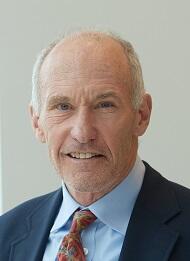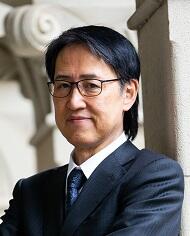The 2022 Keio Medical Science Prize Awardees
Carl H. June, M.D.

Richard W. Vague Professor in Immunotherapy
Director, Center for Cellular Immunotherapies
Director, Parker Institute for Cancer Immunotherapy
University of Pennsylvania Perelman School of Medicine
Reason for Selection
“Development of CAR-T Cell Therapy as a Novel Immunotherapeutic Strategy”
Dr. Carl June has pioneered the clinical application of CAR-T cell therapy, a new class of personalized immunotherapy for cancer and infectious diseases. CAR-T cell therapy uses genetically engineered T cells to produce chimeric antigen receptors (CARs). Dr. June has elucidated the role of the co-stimulatory molecule CD28 in T cell proliferation and, by expressing the CAR in combination with co-stimulatory molecules, has advanced CAR-T cell therapy to a practical level for antigen-specific and potent cytotoxic activity. CAR-T cell therapy has demonstrated breakthrough efficacy in the treatment of refractory acute leukemia, which does not respond to conventional therapies. CAR-T cell therapy has been approved in many countries worldwide and has become an established treatment method in clinical practice. Dr. June's achievements in laying the foundation for further development of new therapeutic strategies through the clinical development of CAR-T cell therapy make him deserving of the Keio Medical Science Prize 2022.
Background
Education
- 1975
- B.S.(Biology) United States Naval Academy, Annapolis, Maryland, USA
- 1979
- M.D.(Medicine) Baylor College of Medicine, Houston, Texas
- 1985
- Postdoctoral Fellow (Oncology/Immunology) Fred Hutchinson Cancer Research Center, Washington
Position
- 1978-1979
- Research Fellow, World Health Organization Immunology Research and Training Center, Geneva, Switzerland
- 1979-1980
- Internship: Basic Medicine, National Naval Medical Center, Bethesda, Maryland, USA
- 1980-1982
- Teaching Fellow, Department of Medicine, Uniformed Services, University of the Health Sciences, Bethesda, Maryland
- 1980-1982
- Residency: Internal Medicine, National Naval Medical Center, Bethesda, Maryland
- 1982-1983
- Instructor, Department of Medicine, Uniformed Services University
- 1982-1983
- Chief Resident: Internal Medicine, National Naval Medical Center, Bethesda, Maryland
- 1983-1985
- Fellow in Oncology, University of Washington and Fred Hutchinson Cancer Research Center, Seattle, Washington
- 1986-1990
- Assistant Professor, Department of Medicine, Uniformed Services
- 1990-1995
- Associate Professor, Department of Medicine, Uniformed Services
- 1995-1999
- Professor, Department of Medicine, Uniformed Services University of the Health Sciences
- 1999-2001
- Professor of Molecular and Cellular Engineering, University of Pennsylvania School of Medicine
- 2001-present
- Professor of Pathology and Laboratory Medicine, University of Pennsylvania School of Medicine
- 2004-present
- Professor of Medicine, University of Pennsylvania School of Medicine
- 2015-present
- Director, Center for Cellular Immunotherapies at the University of Pennsylvania
- 2016-present
- Director, Parker Institute for Cancer Immunotherapy at the University of Pennsylvania
Major Honors/Awards
- 2015
- Paul Ehrlich and Ludwig Darmstaedter Prize (shared with J. Allison)
- 2016
- Novartis Prize in Immunology (shared with Z. Eshhar and S. Rosenberg)
- 2017
- Karnofsky Prize from the American Society of Clinical Oncology
- 2020
- Lorraine Cross Sanford Health Award
- 2021
- Dan David Prize from Tel Aviv University
Comments
On behalf of my team at the University of Pennsylvania, I am humbled to accept the Keio Medical Science Prize in recognition of the development of chimeric antigen receptor T cells for cancer therapy. I am grateful that studies of applications of this technology beyond cancer -- for chronic infections, organ transplantation and autoimmune diseases -- are now underway in clinical trials on a global basis to treat patients in need.
Yoshihiro Kawaoka

Director, Research Center for Global Viral Diseases, National Center for Global Health and Medicine Research Institute
Project Professor, The Institute of Medical Science, The University of Tokyo
Reason for Selection
“Understanding Viral Pathogenicity for the Control of Pandemic Infectious Diseases”
Dr. Yoshihiro Kawaoka has developed a revolutionary technology for the artificial synthesis of influenza viruses. By synthesizing influenza viruses on demand, he succeeded in clarifying their mechanisms of infection and propagation, as well as the acquisition of high virulence and drug resistance at the molecular and cellular levels. Furthermore, he has contributed to the development of new vaccines against novel influenza viruses through the artificial synthesis of viruses. He has also made extensive contributions to pandemic control against the new coronavirus (SARS-CoV2), including evaluation of the pathogenicity of various variants and their reactivity to drugs and the development of animal models of infection.
Background
Education
- 1978
- B.S., Hokkaido University, Japan (Veterinary Medicine)
- 1978
- D.V.M., The Ministry of Agriculture and Fishery, Japan
- 1980
- M.S., Hokkaido University, Japan (Microbiology)
- 1983
- Ph.D., Hokkaido University, Japan (Microbiology)
Positions
- 1980-1983
- Research Associate, Department of Veterinary Microbiology, Faculty of Agriculture, Tottori University, Japan
- 1983-1996
- Postdoctoral Fellow, St. Jude Children's Research Hospital, Tennessee, USA
- 1996-1997
- Member, St. Jude Children's Research Hospital, Tennessee, USA
- 1997-present
- Professor, School of Veterinary Medicine, University of Wisconsin-Madison, Wisconsin, USA
- 1999-2005
- Professor, Department of Microbiology and Immunology, The Institute of Medical Science, The University of Tokyo, Japan
- 2005-2021
- Director, International Research Center for Infectious Diseases, The Institute of Medical Science, The University of Tokyo, Japan
- 2021-present
- Project Professor, The Institute of Medical Science, The University of Tokyo
- 2021-present
- Director, Research Center for Global Viral Diseases, National Center for Global Health and Medicine Research Institute
Major Honors/Awards
- 2006
- Robert Koch Prize (with Peter Palese)
- 2011
- Medal with Purple Ribbon
- 2013
- Member of the United States National Academy of Sciences
- 2015
- Carlos J. Finlay Prize for Microbiology
- 2016
- Japan Academy Prize
Comments
It is my honor to receive the Keio Medical Science Prize and follow in the footsteps of previous awardees whose world-class work I have admired. My selection for this award is humbling, and only made possible thanks to the relentless efforts of past and present members of my laboratories and my collaborators. I am also indebted to the funding agencies and their officers, the personnel at the business offices of my institutions, and my colleagues for their constant support. The COVID pandemic has, and continues to have, devastating effects on public health and economies globally. It is a stark reminder that infectious diseases will always be a threat. I hope to make a lasting contribution to society by working to reduce the burden caused by infectious diseases.
